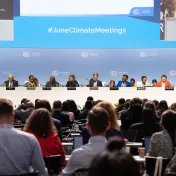From heavy rainfall to rising sea levels, there is no doubt that the climate crisis is having a significant impact on global food security. At the same time, agriculture is contributing to climate change. Food systems will therefore also be discussed at COP29 in Azerbaijan. Germanwatch is calling for this issue to be prioritized and is following the negotiations on site. What should the international community achieve in Baku?
Food systems are responsible for up to a third of human-caused greenhouse gas emissions. At the same time, climate change is jeopardizing global food security through increased extreme weather events and crop failures, thereby also promoting climate-induced migration. The way in which we produce, process and consume food must therefore be given central consideration in international climate negotiations.
The international climate conference COP29, taking place from November 11 to 22 in the Azerbaijani capital Baku, will focus on the climate finance target for the period after 2025 (New Collective Quantified Goal on Climate Finance, NCQG). In order to be able to adapt food systems worldwide to climate change and reduce the emissions from the agriculture and food sector, the global climate finance goal must provide sufficient funding for the transformation of food systems - particularly in the Global South. Access to financing for small-scale producers must be ensured and agroecological approaches that respect planetary boundaries and human rights must be promoted.
Germanwatch will follow the negotiations and developments affecting food systems on site. We demand binding commitments from countries to include emission reduction targets for their food systems in their Nationally Determined Contributions (NDCs). Among other things, the Azerbaijani COP29 presidency will present the “Harmoniya 4 Climate Resilience” initiative, which aims to coordinate existing initiatives for climate-resilient agriculture and food systems. In addition, numerous voluntary initiatives and formal negotiation outcomes are expected at COP29 that will have an impact on global food systems.
You can read our detailed analysis of food systems at COP29 and Germanwatch's general expectations of the climate negotiations in Baku here: Mind the Gap. Climate finance without gaps - Expectations for COP29.






